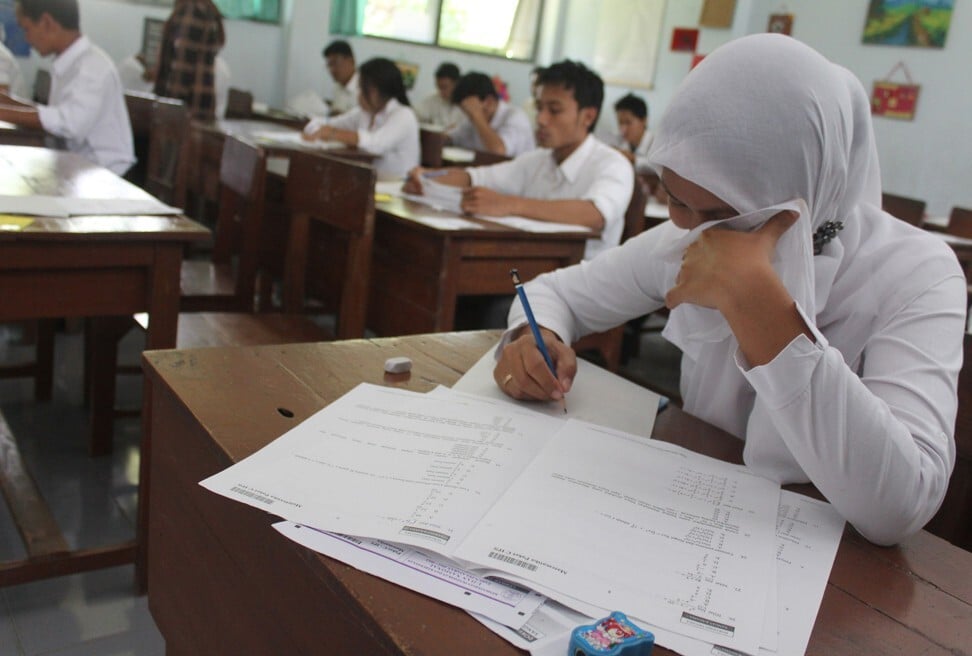Indonesian honour killing: brutal death of schoolgirl Rosmini Darwis, 16, sparks copycat fears
- The girl was hacked to death with a machete and wooden log after she revealed she was dating someone, in a case that has shocked the nation
- While honour killings are common in the Middle East and South Asia, there has until now been no such reports in Indonesia

Indonesia’s first reported honour killing of a schoolgirl earlier this month has shocked the nation and prompted rights activists to warn of a “contagion” effect amid a rising wave of religious ultraconservatism.
Rosmini binte Darwis, 16, began her day on May 9 just like any other since March, staying at home as her school in Bantaeng, South Sulawesi was shut due to the coronavirus pandemic.
The 16-year-old was not in the best of health – she had been vomiting and suffering from fainting spells for weeks. Her family decided she had been “possessed”, and sent her to a shaman instead of a doctor, police said.
Learning of her illness, Rosmini’s cousin Usman came to pay her a visit – an arrival that marked her for death.
Her eldest brother, Rahman, 30, accused Usman of using black magic on his sister, police said.
Rosmini’s admission that she was in a relationship with Usman further inflamed an already emotionally charged situation. Usman denied the claim.
Outraged by the revelation, Rahman began attacking his cousin with a wooden log.
Usman fled, with Rahman and another brother, Surianto, 20, hot on his heels. He managed to evade capture.
When the brothers failed to get Usman, they turned back, but took a young neighbour they met along the way hostage, in a bid to force him to marry Rosmini. He refused.
They brought him back to their home nevertheless, where they gathered him, Rosmini and the rest of the family into a room, where a brutal scene unfolded, police said.
With a machete and a wooden log, Rahman and Surianto hacked Rosmini to death as everyone watched, police said.
Grisly pictures of Rosmini’s blood-soaked body appeared on the internet.
According to police, Rosmini did not fight for her life. “She surrendered herself to her fate,” said Wawan Sumantri, Bantaeng regency police chief.
Wawan said Rosmini was known to be a good daughter who gave the family no trouble and was generally well-treated before that fateful day.
Her two brothers, both farmers, were arrested for her murder.
“Investigation showed she was killed because the family felt ashamed she did not recover and that she had said she was in a relationship with Usman,” Wawan said. “This is a case of honour killing.”
Wawan said it “could not be proved” Rosmini had sexual relations with Usman.
Rosmini’s death stunned Indonesia, the world’s most populous Muslim nation of 270 million, known for its diversity and moderate brand of Islam.
Honour killings are a common phenomenon in the Middle East and South Asia, where girls and women are killed if they are deemed to have brought shame to the family.
Last week in Iran, a 14-year-old girl was decapitated by her father with a sickle as she slept. Romina Ashrafi had run away with her boyfriend a few days before. When she was found, police allowed her father to take her home even though she had told them she was afraid he would punish her violently.
The United Nations estimates that about 5,000 women and girls worldwide die every year in such killings. But they are rarely heard of in Southeast Asia.

Andreas Harsono, a researcher at Human Rights Watch Indonesia, believed her death was the first record of honour killing in the country.
He said he was concerned about the effect it would have. “It will prompt other families to do the same,” Harsono said.
He said Indonesia was witnessing a rise of political Islam which has resulted in more than 700 sharia-inspired laws, ranging from the mandatory wearing of the hijab, to curfews for women.
“Their obsession is to control women's bodies, from their hair to their vaginas, as in the case of virginity testing,” Harsono said.
In Indonesia, women who want to join the military are required to undergo a virginity test.

Psychologist Alissa Wahid, national director of Gusdurian Network Indonesia, a grass roots organisation with activists in more than 100 cities in Indonesia, said there was currently a tendency towards ultraconservatism based on “primordial values”.
“This is what’s worrying. It may not be in the form of killing, but nonetheless it is dangerous to well-being, especially for daughters,” said Alissa, whose father is the late prominent Muslim cleric and former president Abdurrahman Wahid.
Alissa said in her studies, women in some Indonesian families were seen as a burden, blamed for bringing shame to their families if they were unmarried, and were perceived as not needing an education.
Even though many Indonesians condemned the killing, a “contagion” effect was possible, according to Any Rufaedah, a lecturer in social psychology at Indonesia’s Nahdlatul Ulama University.
“If the incident was due to cultural values, the chances of it encouraging other people to do the same is much higher,” she said.
Any said many violent acts waged on people were, more often than not, committed by family members.
“This happens in many countries, even in America,” she said. “Why? Because family members are the closest individuals around you. When someone gets angry, family members are made scapegoats.”
The fact that Rosmini’s family did nothing but watch her die suggested that they believed this was the best punishment for her, Any said.
“Why did they kill a woman? Were there no other solutions? The use of murder is like an era from centuries ago when people knew no law or dialogue,” she said.
Any added the killing also reflected a patriarchal double standard, where sex outside marriage was tolerated more for men but not for women.
“People tend to say women cannot protect their own honour,” she said.
